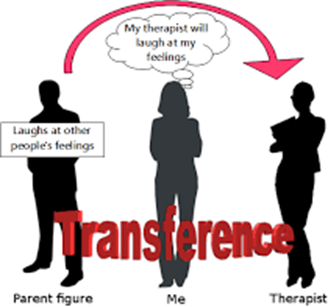As the nurse begins to discuss discharge plans for a 45-year-old female client hospitalized for anxiety, the client states, "You never really cared whether I get better! Why not stop this charade?" The nurse recognizes this to be:
Insecurity
Transference
Countertransference
Secondary gain
The Correct Answer is B
Choice A rationale: this is inaccurate since it does not display insecurity where feelings of inadequacy or uncertainty are displayed affecting the individual’s self-esteem and confidence.
Choice B rationale: transference is a defense mechanism where the patient unconsciously transfers their feelings, expectations, and attitudes from their previous relationship to a current relationship. In this case, the client is projecting her unresolved feelings about someone who did not care for her onto the nurse, who is trying to help her.
Choice C rationale: Countertransference is the process where the nurse unconsciously transfers their unresolved feelings and attitudes from a past relationship to their clients.
Choice D rationale: secondary gain is the benefit received by an individual for being sick, for instance, attention and sympathy. The client’s statement is an indication of rejection of the nurse’s help rather than seeking a secondary gain.

Nursing Test Bank
Naxlex Comprehensive Predictor Exams
Related Questions
Correct Answer is A
Explanation
Choice A rationale: The client is not a problem in a therapeutic relationship but is instead the focus of care and their needs and preferences be considered in their care process.
Therefore, the client should also be encouraged to participate actively in the treatment and to provide feedback on the progress and challenges.
Choice B rationale: The environment, including issues like noise, interruptions, or lack of privacy, can impact the effectiveness of therapeutic interactions.
Choice C rationale: Financial resources, for instance, lack of insurance coverage, high costs of healthcare, and limited access to quality healthcare can impair effective patient care resulting in stress and frustration for the patient.
Choice D rationale: The caregiver's own challenges, such as burnout, communication issues, and lack of knowledge, skills, and experience can impair the quality of care provided to a client thus affecting the therapeutic relationship.
Correct Answer is B
Explanation
Choice A rationale: the nurse is not the primary focus of a therapeutic relationship and does not focus on their personal or professional needs. However, they should always maintain appropriate boundaries and avoid becoming too emotionally involved or attached to the client.
Choice B rationale: the client is the primary focus of a therapeutic relationship hence the care provided should meet the client’s needs, well-being, and expectations.
Choice C rationale: a therapeutic relationship is not focused on establishing a friendship but on developing a working alliance between the nurse and the client.
Choice D rationale: The plan of care is an important tool for guiding the therapeutic relationship, but it is not the focus of the relationship.
Whether you are a student looking to ace your exams or a practicing nurse seeking to enhance your expertise , our nursing education contents will empower you with the confidence and competence to make a difference in the lives of patients and become a respected leader in the healthcare field.
Visit Naxlex, invest in your future and unlock endless possibilities with our unparalleled nursing education contents today
Report Wrong Answer on the Current Question
Do you disagree with the answer? If yes, what is your expected answer? Explain.
Kindly be descriptive with the issue you are facing.
